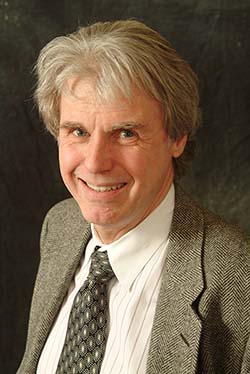Hamlin Jennings, Cement Research Pioneer, Passes Away
Jennings was widely recognized as a preeminent researcher in the cement chemistry field
Former Northwestern University professor Hamlin M. Jennings passed away on July 8 at age 68 after a long battle with cancer. He will be remembered as a dedicated educator, generous mentor, visionary, and friend.
 A prominent scientist and engineer, Jennings was widely recognized as a preeminent researcher in the field of cement chemistry. He was a leading innovator in the electron microscopy of cement and developed the fundamentals of cement sciences, which transformed the concrete engineering field. His work greatly advanced the scientific community’s understanding of hydrated cement’s microstructure and its response to the environment.
A prominent scientist and engineer, Jennings was widely recognized as a preeminent researcher in the field of cement chemistry. He was a leading innovator in the electron microscopy of cement and developed the fundamentals of cement sciences, which transformed the concrete engineering field. His work greatly advanced the scientific community’s understanding of hydrated cement’s microstructure and its response to the environment.
When Jennings began his career in cement science in the 1970s, the field was divided into two branches: cement chemistry and mechanics. Only a small number of researchers explored the intersection of chemistry, materials science, and mechanics. Trained as a physicist and materials scientist, Jennings recognized the glaring absence of a true materials science approach for cement materials. He dedicated the next 35 years to defining this missing methodology.
Jennings was a member of the Northwestern University faculty from 1987 to 2010. During that time, he spent four years as chair of the Department of Civil and Environmental Engineering at the McCormick School of Engineering. When he joined Northwestern, he had a goal to fill the research gap between cement physics and chemistry, an area that he deemed essential in helping meet society’s pressing needs for durable housing and infrastructure. Along with a team, he accomplished this goal by helping to establish the University’s Center for Advanced Cement-based Materials, a National Science Foundation-sponsored multi-institutional, multi-disciplinary research hub aimed at expanding and improving the application of cement and concrete.
In 2000, Jennings published his most widely cited and influential paper, “A model for the microstructure of calcium-silicate-hydrate (C-S-H) cement paste.” This was known for years as the “colloid model” of C-S-H and later became the “Jennings Colloid Model.” His model closed the loop between molecular understanding and manufacturing of cement-based materials, so that now it is possible to design cement-based materials with specific strength, fracture, and durability properties.
Before joining Northwestern, Jennings served as a physical scientist at the National Institute of Standards and Technology (NIST) in the US Department of Commerce, where he built a group in computational materials science for concrete. During this time, he developed the first computer model of cement hydration. It proved to be groundbreaking work that was lauded by his contemporaries and helped launch a new field of computational cement science. This ultimately led to NIST’s development of the Virtual Cement and Concrete Testing Laboratory.
Jennings ended his productive career as an adjunct professor of civil and environmental engineering at the Massachusetts Institute of Technology, where he also served as the inaugural director of the MIT Concrete Sustainability Hub. He led a multi-disciplinary team of physicists, materials scientists, chemists, engineers, and architects, pushing it to new frontiers of science-based engineering. His most recent research efforts focused on developing sustainable cement-based materials for housing and infrastructure in India.
Though his distinguished career impressed many, even more were impressed by his character. Jennings was a dedicated educator, inspiring instructor, encouraging mentor, and valued colleague, noted for his conscientious spirit and humble nature. He left a lasting impact on his many students and colleagues — in the classroom, on the drawing tables and whiteboards of his offices at Northwestern and MIT, and through the more than 200 scholarly papers he authored and coauthored that will forever carry his legacy.
Jennings is survived by his wife, Glenys Jennings; his mother, Bojan Jennings; and his daughter, Ashley Jennings.